Serving 368 students in grades Kindergarten-8, Yermo Elementary School ranks in the bottom 50% of all schools in California for overall test scores (math proficiency is bottom 50%, and reading proficiency is bottom 50%).
The percentage of students achieving proficiency in math is 24% (which is lower than the California state average of 33%). The percentage of students achieving proficiency in reading/language arts is 26% (which is lower than the California state average of 47%).
The student:teacher ratio of 17:1 is lower than the California state level of 21:1.
Minority enrollment is 66% of the student body (majority Hispanic), which is lower than the California state average of 80% (majority Hispanic).
Quick Stats (2025)
- Grades: Kindergarten-8
- Enrollment: 368 students
- Student:Teacher Ratio: 17:1
- Minority Enrollment: 66%
- Overall Testing Rank: Bottom 50% in CA
- Math Proficiency: 24% (Btm 50%)
- Reading Proficiency: 26% (Btm 50%)
- Science Proficiency: 15-19% (Btm 50%)
- Source: National Center for Education Statistics (NCES), CA Dept. of Education
Top Rankings
Yermo Elementary School ranks among the top 20% of public schools in California for:
Category
Attribute
Student Attention
School Overview
Yermo Elementary School's student population of 368 students has stayed relatively flat over five school years.
The teacher population of 22 teachers has grown by 15% over five school years.
Grades Offered
Grades Kindergarten-8
Total Students
368 students
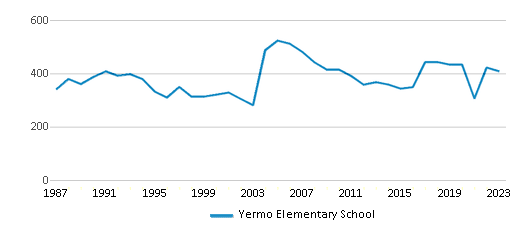
Gender %
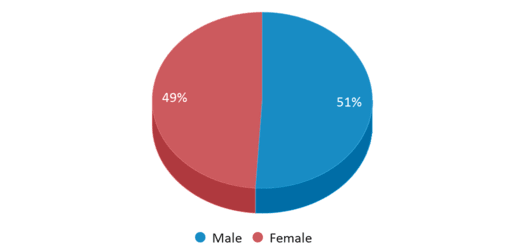
Total Classroom Teachers
22 teachers
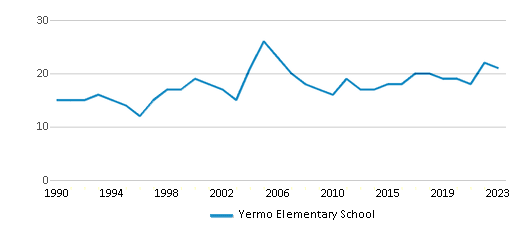
Students by Grade
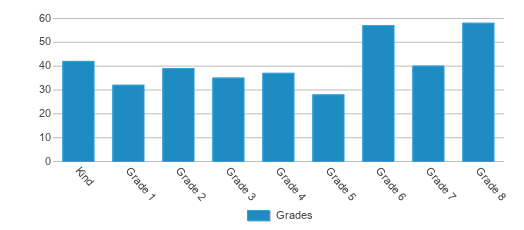
School Rankings
Yermo Elementary School ranks within the bottom 50% of all 9,602 schools in California (based off of combined math and reading proficiency testing data).
The diversity score of Yermo Elementary School is 0.61, which is less than the diversity score at state average of 0.63. The school's diversity has stayed relatively flat over five school years.
Overall Testing Rank
#6663 out of 9602 schools
(Bottom 50%)
(Bottom 50%)
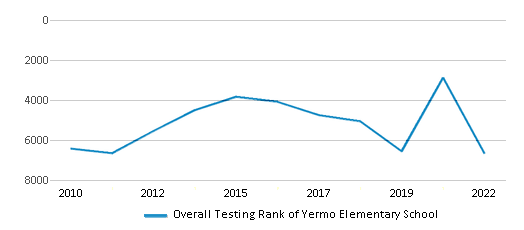
Math Test Scores (% Proficient)
24%
33%
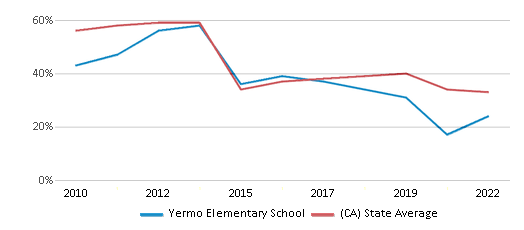
Reading/Language Arts Test Scores (% Proficient)
26%
47%
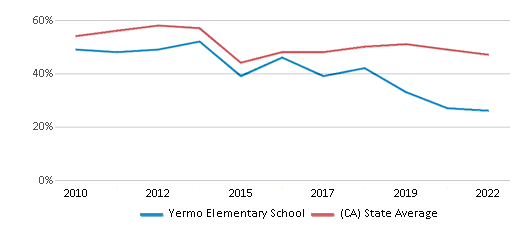
Science Test Scores (% Proficient)
15-19%
29%
Student : Teacher Ratio
17:1
21:1
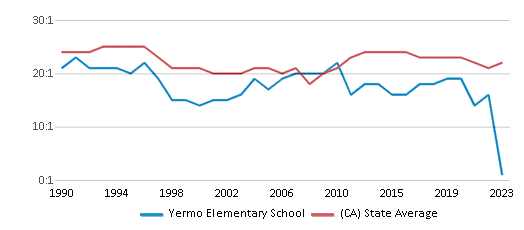
American Indian
n/a
1%
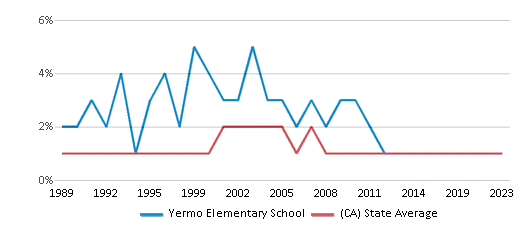
Asian
1%
12%
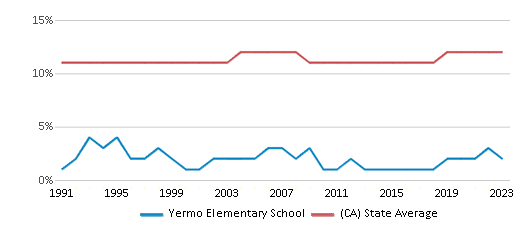
Hispanic
52%
56%
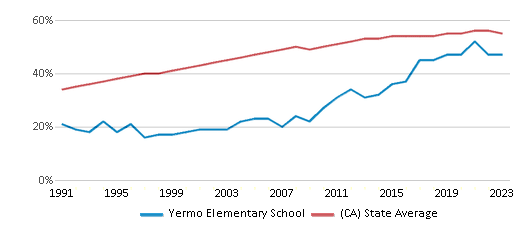
Black
2%
5%
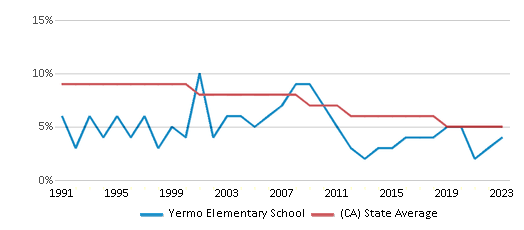
White
34%
20%
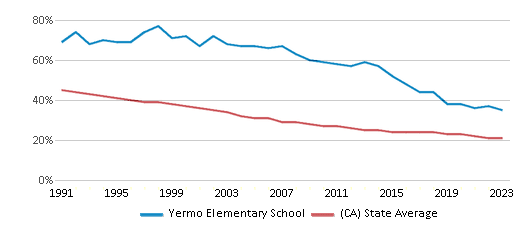
Hawaiian
2%
n/a
Two or more races
9%
6%
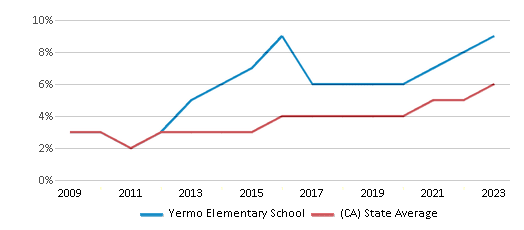
All Ethnic Groups
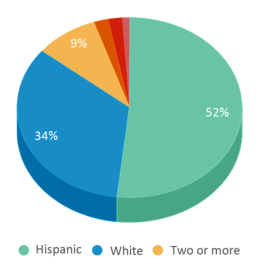
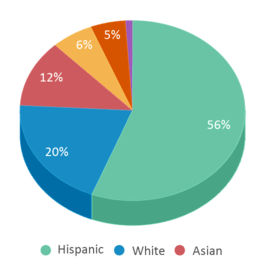
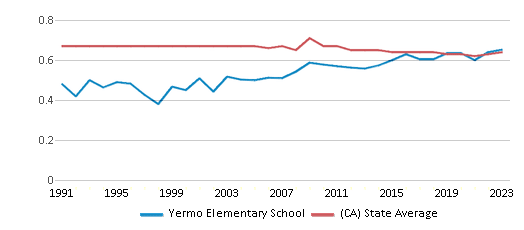
Eligible for Free Lunch
73%
54%
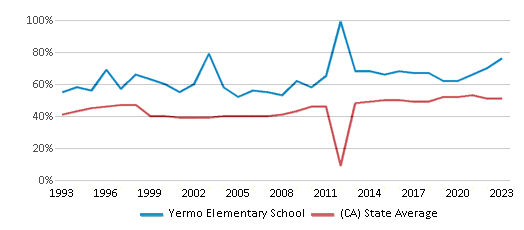
Eligible for Reduced Lunch
10%
8%
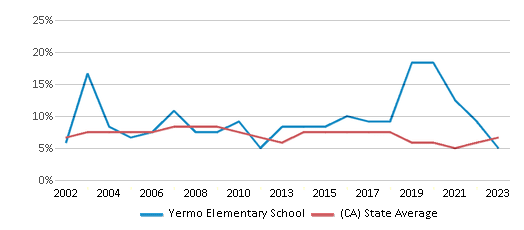
School Statewide Testing
School District Name
Source: National Center for Education Statistics (NCES), CA Dept. of Education
Profile last updated: 02/09/2025
Frequently Asked Questions
What is Yermo Elementary School's ranking?
Yermo Elementary School is ranked #6663 out of 9,602 schools, which ranks it among the bottom 50% of public schools in California.
What percent of students have achieved state testing proficiency in math and reading?
24% of students have achieved math proficiency (compared to the 33% CA state average), while 26% of students have achieved reading proficiency (compared to the 47% CA state average).
How many students attend Yermo Elementary School?
368 students attend Yermo Elementary School.
What is the racial composition of the student body?
52% of Yermo Elementary School students are Hispanic, 34% of students are White, 9% of students are Two or more races, 2% of students are Black, 2% of students are Hawaiian, and 1% of students are Asian.
What is the student:teacher ratio of Yermo Elementary School?
Yermo Elementary School has a student ration of 17:1, which is lower than the California state average of 21:1.
What grades does Yermo Elementary School offer ?
Yermo Elementary School offers enrollment in grades Kindergarten-8
What school district is Yermo Elementary School part of?
Yermo Elementary School is part of Silver Valley Unified School District.
School Reviews
2 9/1/2016
My kids attend Yermo I am not pleased with the school and how they teach if a student struggles has trouble focusing they don't help they leave your kid struggling, or shove them out the door to speech when they don't have a speech problem because there to lazy to deal with them, or they leave it up to another student to explain. Every teacher my 3rd grade daughter has had always makes excuses I have 30 other students I can't just stop and help. My daughter this year has already gotten a note sent home from her teacher saying it took her two days to do this she needs to focus. My question is why is it taking my child two days to get an in class assignment done. What happened to the day where teachers would get the rest of the class on task and come kneel down and help the ones struggling. They did what they could to make sure you understood and that your work got done they never gave up on helping you. Another thing that bothers me is they harass my oldest daughter about the way she holds the pencil, every school year teachers tell her she's holding it wrong, there more concerned about the way she holds the pencil then helping her find better ways to focus. What happened to as long as the teacher can read your writing and your work gets completed that's all that matters.
Review Yermo Elementary School. Reviews should be a few sentences in length. Please include any comments on:
- Quality of academic programs, teachers, and facilities
- Availability of music, art, sports and other extracurricular activities
Recent Articles

What Is A Charter School?
Explore the world of charter schools in this comprehensive guide. Learn about their history, how they operate, and the pros and cons of this educational innovation. Discover key facts about charter schools, including admission policies, demographics, and funding, as well as what to look for when considering a charter school for your child.

10 Reasons Why High School Sports Benefit Students
Discover the 10 compelling reasons why high school sports are beneficial for students. This comprehensive article explores how athletics enhance academic performance, foster personal growth, and develop crucial life skills. From improved fitness and time management to leadership development and community representation, learn why participating in high school sports can be a game-changer for students' overall success and well-being.

February 05, 2025
Understanding the U.S. Department of Education: Structure, Impact, and EvolutionWe explore how the Department of Education shapes American education, from its cabinet-level leadership to its impact on millions of students, written for general audiences seeking clarity on this vital institution.






